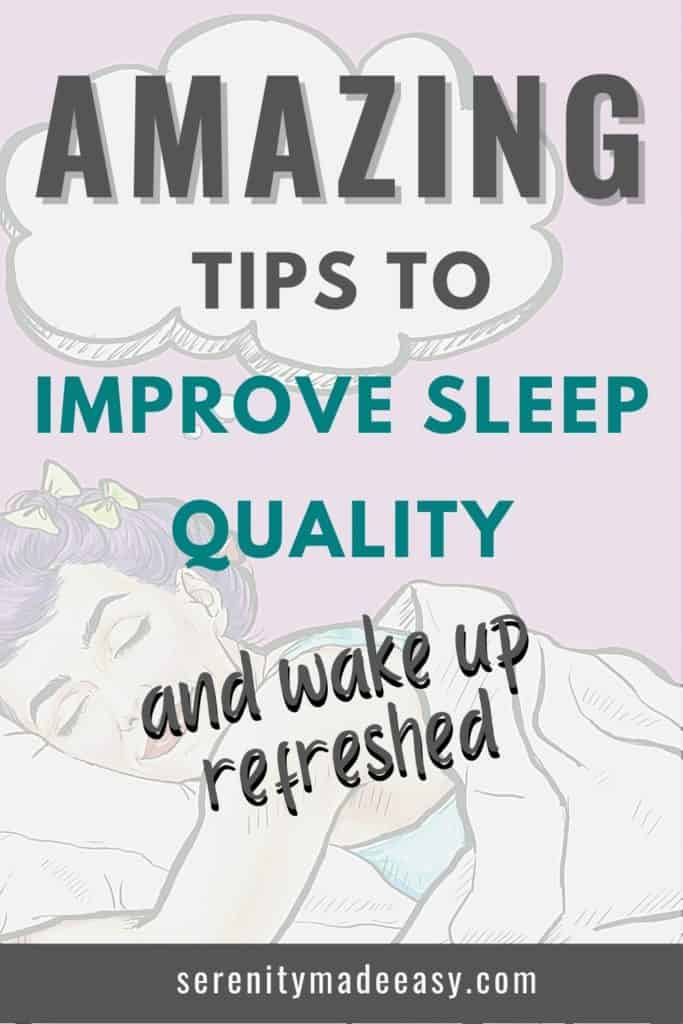This post may contain affiliate links. If you click one and make a purchase, I earn a small commission at no extra cost to you. It helps support the site so I can continue to offer great content to you!

Did you know that sleep is one of the fundamental pillars for both a healthy body and a sharp mind? During your childhood, it’s probably that your parents told you about the importance of sleep. However, did their words truly resonate with you? Did you ever wonder the reasons behind their emphasis on sleep and whether or not they were correct? In this article, we will dive into the significance of sleep and explore how to improve sleep quality. If your primary interest is learning how to improve sleep, feel free to jump straight to my best tips.
| “Happiness in simplicity can be achieved with a flexible mindset and nine hours of sleep each night” ~ Dalai Lama |
Why does sleep matter anyway?
Sleep is a foundational aspect of maintaining a healthy body and sharp mind. Sleep, like healthy nutrition and exercise, is key to avoiding illness and living a healthy life. It should not be underestimated. However, sleep deprivation is a real thing. According to the CDC, about 35% of adults in the United States sleep less than the 7 hours of recommended sleep.
Not only is getting enough sleep a crucial component of health, new a new 2023 research reveals that a regular sleep partner is equally important. Adults who go to bed, wake at a consistent time, and get enough sleep reduce their risk of mortality by 39%.
Furthermore, a recent study performed in the UK in 2021 confirmed a link between mental illness and sleep. The correlation appears to go both ways. Poor sleep can increase the chances of mental illness while mental illness can impact the quality and quantity of your sleep. Ultimately, any changes to your normal and required amount of sleep have been reported as a possible factor of increased mental illness.
Benefits of getting enough sleep
- Can improve cognitive functions such as concentration, memory, problem-solving skills, and productivity.
- Regulates behaviors and emotional responses to stress and other unexpected life situations.
- Reduces vulnerability to some diseases and medical conditions such as:
- Weight gain and obesity: Lack of sleep can cause imbalances of the Ghrelin and Leptin hormones. These hormones are responsible for providing hunger and fullness cues to the body. When they are not performing as expected, people can have a tendency to overeat. Additionally, when a person is tired, their motivation to exercise has also been shown to be reduced.
- Type 2 Diabetes: Very low sleep can affect sugar metabolism and therefore increase someone’s risk of developing type 2 Diabetes. In fact, a study demonstrated that people who sleep less than 7 hours a night have 40% more chances to get type 2 Diabetes!!
- High blood pressure and heart diseases: Sleeping less than 7 hours per night can increase your risk of heart disease and heart blood pressure. The study also states that this is particularly true for the Asian and elderly populations.
- Harmful gut bacteria: A new study in 2023 revealed that an irregular sleep pattern is associated with a higher level of harmful bacteria in your gut. Gut health is at the center of our overall health.

How much sleep do we really need?
The amount of recommended sleep varies but is mostly driven by age. Here is what experts recommend.
| Age Group | Recommended sleep Hours |
| Infants – 4 months to 12 months | 12-16 hours per 24 hours, including naps |
| 1 – 2 years | 11-14 hours per 24 hours, including naps |
| 3 – 5 years | 10-13 hours per 24 hours, including naps |
| 6 – 12 years | 9-12 hours per 24 hours |
| 13 – 18 years | 8-10 hours per 24 hours |
| Adults | 7 hours or more per 24 hours |
Other factors such as the quality of your sleep, pregnancy, and illness also contribute to the amount of sleep you might need.
How does sleep work?
As human beings, we find ourselves in one of two states throughout the day: the wake and the sleep state. In fact, our body transitions between these two states on a cyclical basis. These cycles are driven by our circadian rhythms. This process is primarily influenced by natural daylight and factors in your body. In addition to affecting your sleep, a circadian rhythm that is not working correctly can cause hormone imbalance, poor eating habits, digestive problems, and even impact your body temperature.

A body with a well-functioning circadian rhythm will release melatonin at night, a hormone that induces sleepiness. In the morning, the body will release cortisol which promotes energy and gets you ready for the day.

If your circadian rhythm isn’t working well, or if you find yourself sleeping poorly due to other factors, there are several things that you can try.
How to improve sleep quality and quantity?
Dealing with poor sleep or insomnia can be extremely stressful. Like many, I have dealt with this from time to time. I have done extensive research on the topic over the years and experimented with many techniques I read about. Let me share what has worked for me to improve REM sleep, deep sleep, and core sleep.

Best tips to improve sleep quality

- Implement a bedtime routine. Routines aren’t just for babies. A bedtime routine is a great way to help your body and circadian rhythm understand when bedtime is coming and improve sleep quality. As previously mentioned, this will allow your body to start releasing melatonin, a sleepiness-inducing hormone.
- Get up at the same time every day. The more consistency you create in your sleep routine, the easier to maintain it will be. If this is difficult for you, set an alarm, even on weekends, and resist the urge to hit the snooze button. Consider investing in a sunrise simulation clock. They aren’t cheap, but have been researched and proven quite effective.
- Have a dedicated sleep area. This may seem odd to some, but many children and adults sleep in various areas of their homes. This can include the living room couch or the basement floor. Having a fixed and consistent place where you sleep will help your body associate this location with sleep. Furthermore, reserve this place for sleeping only.
- Make your sleeping area dark. As previously discussed, the circadian rhythm is strongly influenced by natural light. A dark bedroom will help your body transition into the sleep cycle even during summer nights when it might remain light quite late into the evening. We’ve had these blackout curtains for several years, they are great and even help with temperature control in the room.
- Maintain a comfortable temperature. I realize this may not be possible for everyone. However, when possible, keep your bedroom at a comfortable temperature. This temperature is based on what you find comfortable. Generally speaking, you should not wake up too cold or too hot throughout the night.
- Invest in a good mattress, pillow, and sheets. The quality of your sleep equipment does matter. You do not need to invest in the most expensive mattress, but researching and investing in better solutions for your body is important. Also, many mattress and pillow brands even allow you to try them for a few months and return them at no charge if you are unsatisfied. A few years ago we purchased a purple mattress. This was the best purchase for us. I absolutely LOVE our mattress. Here are the sheets we are planning to purchase next. I’ve heard so much about them and cannot wait to try them!
- Turn off electronics. This is a difficult habit to implement for many of us. However, electronic items such as tablets, phones, and computers emit blue light. Research has demonstrated that blue light limits your body’s ability to release melatonin, the sleep hormone. Turning off your electronics 30-60 minutes before bed will improve the speed at which you can fall asleep. If limiting your exposure isn’t possible, consider getting a pair of blue-light protective eyeglasses like this one. They are proven to be really effective.
- Take magnesium. Magnesium is a mineral that can help you sleep better and longer. I take two tablets of Magnesium Breakthrough 60 minutes before going to be. It works wonders for me! I am not a medical professional. You should always talk to your doctor before adding any medications or supplements.
- Reduce caffeine and alcohol intake
- Exercise. Exercise is a great way to reduce stress and calm your brain down when the time for sleep comes. Additionally, exercise causes your brain to release a variety of crucial hormones(endorphin & serotonin) that are supportive of sleep.
“A good laugh and a long sleep are the best cures in the doctor’s book.” ~ Irish Proverb
In conclusion…
The benefits associated with sleep cannot and should not be underestimated. If you are dealing with poor sleep, I hope this article provided you with potential root causes and ideas to improve sleep quality.
Thank you for reading.
Good night!
Cat xx

